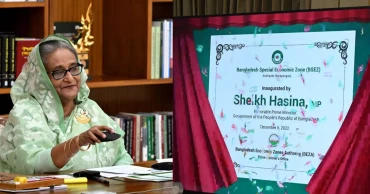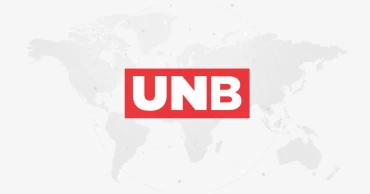Japanese companies
BSEZ can provide investors best possible environment in region: Ito Naoki
Outgoing Japanese Ambassador to Bangladesh Ito Naoki has said the just-launched Bangladesh Special Economic Zone (BSEZ) at Araihazar in Narayanganj will undoubtedly attract investment not only from Japanese companies but also from other international companies.
He said the BSEZ fully meets the international standard in terms of facilities and infrastructure SEZ has to offer.
Read more: PM opens Japanese Economic Zone: Expected to draw $1.5bn investment, create over 1 lakh jobs
“I expect more than 100 companies will operate here in the future, with US$ 1.5 billion investment in total. BSEZ can provide prospective investors with the best possible environment in the region,” he said on Tuesday.
Prime Minister Sheikh Hasina officially opened Bangladesh Special Economic Zone, also known as the “Japanese Economic Zone” at Araihazar in Narayanganj. She joined the event virtually from her official residence Ganabhaban in Dhaka.
There have already been inquiries from approximately 30 Japanese companies and 10 foreign companies looking at the possibility of investing in the BSEZ.
In 2026, Ambassador Naoki said, Bangladesh will graduate from the LDC status and it is a wonderful feat for Bangladesh under this government.
“Then, the country aims to become a developed country in 2041 by achieving Vision 2041. I want to reiterate that Japan will continue to stand by Bangladesh in its development journey and work to build a win-win partnership for our prosperous future,” he said, adding that the success of BSEZ will surely guide them to get there.
The Ambassador said he will return to Japan next week completing his tenure in Dhaka and he put in his best efforts over the last three years for the development of Bangladesh.
Read more: Japan will continue to work toward resolution of Rohingya issue: Ambassador
“I sincerely hope that the dream of Bangabandhu to build Sonar Bangla and a happy and prosperous country will be realized,” he said.
Bangladesh Economic Zones Authority (BEZA) Executive Chairman Shaikh Yusuf Harun and President and CEO, Sumitomo Corporation Masayuki Hyodo also spoke.
BSEZ is the first Special Economic Zone in Bangladesh designed and developed by Japanese companies. Eight years have passed since former Prime Minister Shinzo Abe and Prime Minister Sheikh Hasina shared their intention to cooperate for economic zone development.
“I am delighted that our leaders' intention was finally materialized, overcoming all the challenges we faced, including the Covid-19,” said the Ambassador.
“This is the Japanese Economic Zone. But, BEZA gave the name 'Bangladesh Special Economic Zone (BSEZ).’ I believe BEZA and the government did so with the expectation that it would become the flagship SEZ in Bangladesh,” he said.
Naoki said it will play a pivotal role in boosting FDIs and become a symbol of the growing business partnership between Japan and Bangladesh.
This month, following the opening of BSEZ, Dhaka Mass Rapid Transit (MRT) Line 6 will start commercial operation.
MRT Line 1 and Line 5 North will start construction next year in 2023. Then, the Hazrat Shahjalal International Airport Expansion of terminal 3 will do a soft-opening next October, said the Japanese Ambassador.
Read more: Momen ‘not worried’ about Japanese Ambassador’s remarks, calls him a ‘simple, good person’
Matarbari Deep Sea Port is also under construction, with the prospect of completion of the Power-plant in 2024, and Bangabandhu Railway Bridge will open in the same year, he said.
These quality infrastructure projects by JICA will transform the nation and significantly enhance Bangladesh's economic opportunities, he said.
The ambassador said Bangladesh needs to continuously address some challenges to improve the business climate and Japan and Bangladesh should join hands to that end.
“It is noteworthy that BSEZ has declared to be a corruption-free SEZ, showing its determination to eliminate corruption for a fair and favorable investment and business environment,” he said.
BEZA Executive Chairman Shaikh Yusuf Harun said the economic zone will help attract US$ 1.5 billion investment and create employment opportunities for over 100,000 people.
Sumitomo Corporation President and Chief Executive Officer Masayuki Hyodo said this economic zone is so special and is strongly supported by the two governments and private sectors.
“We have more than 30 years of experience in this business and we have been actively engaged in various infrastructure projects in Bangladesh,” said the President and CEO of the Corporation.
Hyodo said they have been contributing to Bangladesh for sustainable economic development and prosperity.
3 years ago
With eye on 3 SEZs, Japan wants to boost its investment in Bangladesh
Japan eyes three special economic zones (SEZs), including the one at Araihajar, Narayanjanj, to give a big boost to Japanese investment in Bangladesh but things depend on the success of the first one, says Japanese Ambassador to Bangladesh Naoki Ito.
“This (Araihajar EZ) should provide the best possible environment and the best possible incentives for the investors,” he said, adding that a special economic zone is a very important key to invite an increasing number of Japanese companies to invest in Bangladesh.
Ambassador Ito said he has been advocating that Araihajar should be the best possible economic zone in Asia, beating its rivals in countries like Vietnam, Myanmar and the Philippines.
The envoy said they will look into opportunities at Mirsarai under Bangabandhu Sheikh Mujib Shilpa Nagar, being developed on a contiguous land of 30,000 acres, and a possible economic zone in Maheshkhali-Matarbari area if Araihajar becomes successful.
He shared the plans on the three potential economic zones for the Japanese investors in Bangladesh while responding to questions at a virtual dialogue titled “Bangladesh-Japan Relations: Prognosis for the Future” where he delivered the keynote speech.
Cosmos Foundation, the philanthropic arm of the Cosmos Group, hosted the dialogue as part of its ongoing Ambassador’s Lecture Series.
The opening remarks were delivered by the Cosmos Foundation Chairman Enayetullah Khan. The session was chaired by Dr Iftekhar Ahmed Chowdhury, renowned scholar-diplomat and former Advisor on Foreign Affairs of Bangladesh Caretaker Government.
Md Abul Kalam Azad, Special Envoy, Climate Vulnerable Forum; Hayakawa Yuho, Chief Representative, JICA Bangladesh Office; Dr Salehuddin Ahmed, former Governor, Bangladesh Bank; Prof Masaaki Ohashi, Professor, University of the Sacred Heart, Tokyo; Manzurul Huq, Columnist, writer and academic; Prof Takahara Akio, Dean, Graduate School of Public Policy, the University of Tokyo and Ambassador (Retd) Tariq A Karim, Honorary Advisor Emeritus, Cosmos Foundation comprised the panel of discussants.
Read: Ambassador Ito sees 5 challenges ahead to elevate Dhaka-Tokyo ties
Ambassador Ito said the Economic Zone at Araihajar will be ready for its operation by the end of the next year.
4 years ago
Companies give vaccines to workers, boosting Japan’s rollout
Thousands of Japanese companies began distributing COVID-19 vaccines to workers and their families Monday in an employer-led drive reaching more than 13 million people that aims to rev up the nation’s slow vaccine rollout.
Yuka Daimaru, among the Suntory workers getting the shot on a sprawling office floor, was visibly relieved after spending more than a year worrying about the coronavirus.
“I was nervous, but it didn’t hurt as much as I thought it would,” she said. “Now I don’t have to worry as much on commuter trains or at meetings.”
Read: China's comical picture 'The Last G-7' raps Japan's Fukushima water
The Tokyo-based beverage maker plans to inoculate 51,500 people, including part-time workers and employees’ families, with the Moderna vaccine.
About 3,500 companies have signed up for the free vaccines, and that number is growing. The companies must present a plan to inoculate at least 1,000 people per site. But they decide whom to include, such as families, affiliate companies and suppliers.
Universities are also eligible. Smaller companies can apply through organizations, such as the local merchant association, so ideally no one falls through the cracks, according to the health ministry.
Among those taking part are major automaker Toyota Motor Corp., planning to vaccinate 80,000 people at its plants and offices.
Read:Japan’s vaccine push ahead of Olympics looks to be too late
Fast Retailing, behind the Uniqlo clothing chain, is inoculating 18,500 people, including part-timers and cleaning and cafeteria staff, starting July 1.
Online retailer Rakuten said it’s vaccinating 60,000 workers and their families.
Company applications for the vaccines are accepted through February 2022.
Japan is relying totally on imported vaccines for a campaign that started in February with medical professionals. Only about 6% of Japanese are fully vaccinated. Japan has had more than 14,000 deaths from COVID-19.
Local governments and Japan’s self-defense forces are also leading the vaccination campaign, but the employer-led efforts are helping accelerate the pace.
Read:Japan opens mass vaccination centers 2 months before Games
Daisuke Sen, a human resources senior general manager at Suntory Holdings, said the vaccinations at his company will be completed by the end of August.
The first day for the vaccinations came after weeks of work, especially scrambling to find doctors and nurses to carry out the shots, he said.
“Getting here means so much for me,” he said.
4 years ago




